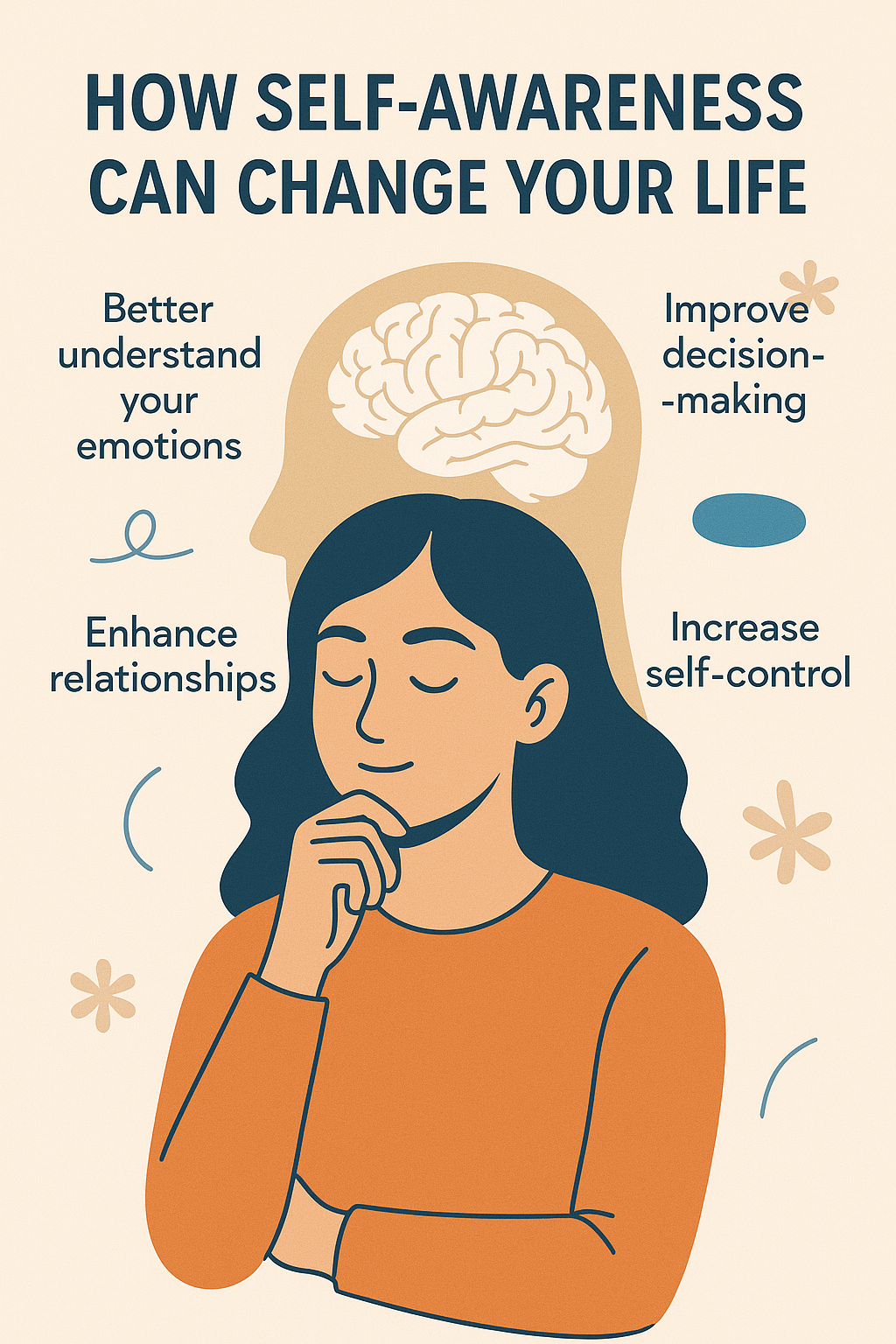Self-awareness is one of the most powerful tools for personal growth. When you understand your thoughts, emotions, behaviors, and motivations, you gain the ability to make better decisions, improve relationships, and lead a more intentional life.
In this article, we’ll explore what self-awareness really means, why it matters, and how to develop it day by day.
What Is Self-Awareness?
Self-awareness is the conscious knowledge of your own character, feelings, desires, and motivations. It’s your ability to reflect on your internal state and how it affects the way you interact with the world.
There are two main types of self-awareness:
- Internal Self-Awareness: Understanding your values, emotions, goals, and impact on others.
- External Self-Awareness: Understanding how others perceive you and how your actions affect them.
Both are essential for balanced growth and emotional intelligence.
Why Self-Awareness Matters
When you’re self-aware, you’re more capable of:
- Responding instead of reacting
- Making decisions aligned with your values
- Recognizing patterns that hold you back
- Building stronger, more authentic relationships
- Managing stress and conflict with clarity
Self-awareness is the foundation of personal transformation. Without it, change becomes guesswork.
Signs You Lack Self-Awareness
Most people assume they are self-aware, but studies show only 10–15% actually are. Here are some signs you might need to develop more awareness:
- You often feel misunderstood
- You struggle to explain your feelings
- You repeat negative patterns in relationships or work
- You react emotionally and regret it later
- You find it hard to take feedback
The good news is that self-awareness is a skill you can improve with consistent practice.
How to Increase Self-Awareness
Let’s explore practical steps you can take to build this powerful habit:
1. Start With Daily Reflection
Take 5–10 minutes at the end of each day to ask yourself:
- What did I feel today, and why?
- What went well, and what didn’t?
- How did I respond to stress or conflict?
- What could I do differently tomorrow?
Write your answers in a journal. Over time, you’ll see patterns that provide insight into your emotional habits and decision-making.
2. Observe Your Emotional Triggers
Notice what events, people, or situations trigger strong emotional reactions in you. Ask yourself:
- Why did I react that way?
- What belief or fear might be behind this response?
- What does this say about me?
Understanding your triggers helps you respond more intentionally in the future.
3. Ask for Honest Feedback
People close to you can often see blind spots that you miss. Ask trusted friends, colleagues, or mentors:
- “How do I come across when I’m stressed?”
- “Is there something I often do that I might not notice?”
- “What’s something I could improve in how I communicate?”
Listen with openness, not defensiveness. Their insights can be eye-opening and valuable.
4. Practice Mindfulness
Mindfulness strengthens your ability to observe thoughts and emotions without judgment. A daily mindfulness practice, even for five minutes, can deepen your self-awareness.
Start with:
- Focusing on your breath
- Noticing thoughts without reacting
- Observing bodily sensations and emotional shifts
The more aware you are in the moment, the more control you have over your reactions.
5. Know Your Core Values
Self-awareness includes knowing what truly matters to you. Identify 3–5 core values (like honesty, growth, family, or creativity) and ask:
- Am I living in alignment with these values?
- Where do I compromise them?
- What decisions would honor these values more fully?
Living by your values creates clarity, peace, and purpose.
The Connection Between Self-Awareness and Success
Whether in personal life or career, self-awareness is linked to:
- Better leadership
- Higher emotional intelligence
- Stronger communication skills
- Improved decision-making
- Greater resilience
Top performers in business and relationships often attribute their success to the ability to understand themselves and others deeply.
Common Myths About Self-Awareness
Let’s clear up a few misunderstandings:
- Myth: Self-awareness is about overanalyzing everything.
Truth: It’s about noticing patterns and using that information wisely. - Myth: Self-awareness makes you more self-critical.
Truth: It actually leads to more self-compassion and self-control. - Myth: You’re either born with it or not.
Truth: It’s a skill that improves with practice, like any other.
Final Thought: Know Yourself to Grow Yourself
The journey to self-awareness doesn’t happen overnight. It requires honesty, curiosity, and courage. But with time, you’ll gain insights that lead to healthier habits, stronger relationships, and a more meaningful life.
Start small. Observe your emotions. Reflect on your day. Ask for feedback. Then use what you learn to move forward with clarity and confidence.
